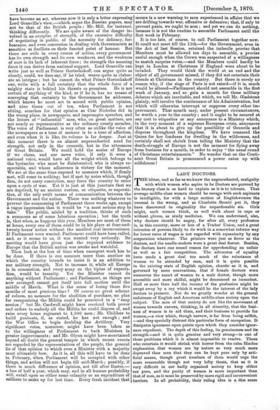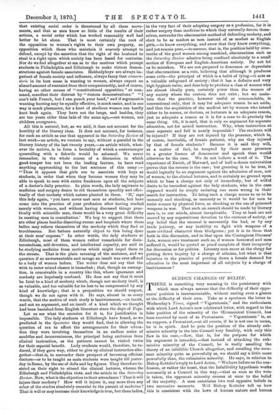LADY DOCTORS.
THE bitter, and as far as we know the unprecedented, malignity with which women who aspire to be Doctors are pursued by the literary class is as hard to explain as it is to tolerate. That average middle-class women should be savage with such aspirants is intelligible, for with a large section of Englishwomen the unusual is the wrong, and as Charlotte Bronte put it, they have discovered in originality the unpardonable sin. Girls might, such women think, as well walk about in caps or without gloves, as study medicine. We can understand, also,
why doctors should be angry, for after all, every profession is, in this country, more or less of a Trades' Union, and a great
intrusion of persons likely to do work in a somewhat inferior way for lower rates of wages is not regarded with equanimity by any corporation whatever. The printers were just as fierce as the doctors, and the needle-makers were a great deal fiercer. Besides, the doctors have one sound reason for apprehending an unfair as well as a fair competition. The advocates of equality have made a great deal too much of the reluctance of women to be attended by men, and it is quite possible in the existing state of English opinion, chaotic as it is, and governed by mere conventions, that if female doctors were numerous the resort of women to a male doctor, though more accessible and more skilful, might be denounced as immodest. Half or more than half the income of the profession might be swept away by a cry which it would be the interest of the lady doctors to promote. Nor do we greatly wonder at the general unfairness of English and American middle-class society upon the subject. The men of that society do not like the movement of women towards careers, thinking, in all sincerity, that the busi- ness of women is to aid them, and their business to provide for women,—a view which, though narrow, is far from being selfish, —and they specially distrust this particular form of occupation. It dissipates ignorance upon points upon which they consider ignor- ance expedient. The depth of this feeling, its genuineness and its strength—and it is quite genuine and very strong—is one of those problems which it is almost impossible to resolve. Those who entertain it would shrink with horror from the calm Hindoo explanation that women are by nature so very much more depraved than men that they can be kept pure only by arti- ficial means, though great numbers of them would urge the more reasonable though not very lofty thesis, that as it is very difficult in our badly organized society to keep either sex pure, and the purity of women is more important than that of men, so it must be preserved by more rigid and inconvenient barriers. In all probability, their ruling idea is a dim sense that existing social order is threatened by all these move- ments, and that as men know so little of the results of their actions, a social order which has worked reasonably well had better be let alone. That is most certainly the root of the opposition to women's rights to their own property, an opposition which those who maintain it scarcely attempt to defend, except by the assertion that the right of the husband to steal is a right upon which society has been based for centuries. Nor do we feel altogether at sea as to the motives which prompt students in Philadelphia and Edinburgh to make riotous demon- strations against female associates. Hobbedyhoys are always im- patient of female society and influence, always fancy that camara- derie in its best sense is wanting to women, always expect an absurd amount of restraint from their companionship, and of course, having no other means of " constitutional opposition " at com- mand, manifest their distrust by " riotous demonstrations." " I can't talk French, but I can punch your head," and if argument is wanting hooting may be equally effective, is much easier, and in one way is much pleasanter, for a knot of studious women can hardly hoot back again. They have not the lungs, and besides, they are ten years older than lads of the same age,—are women, not children overgrown.
All this is natural, but, as we said, it does not account for the hostility of the literary class. It does not account, for instance, for such an article as one that appeared in the Saturday Review of last week—an article, we venture to say, without a parallel in the literary history of the last twenty years,—an article which, what- ever its motive, is in form a brutality of which a coetermonger quarrelling with a fishwife would be ashamed. We never remember, in the whole course of a discussion in which good-temper has not been the leading feature, to have read anything approaching to the last sentence of this essay :— " Thus it appears that girls are to associate with boys as students, in order that when they become women they may be able to speak to men with entire frankness upon all the subjects of a doctor's daily practice. In plain words, the lady aspirants to medicine and surgery desire to rid themselves speedily and effec- tually of that modesty which nature planted in them. ' If,' says this lady again, ' you have never met men as students, but have come into the practice of your profession after having studied merely with women, and without having discussed things prac- tically with scientific men, there would be a very great difficulty in meeting men in consultation.' We beg to suggest that there are other places besides dissecting-rooms and hospitals where these ladies may relieve themselves of the modesty which they find so troublesome. But fathers naturally object to this being dime at their sons' expense." In other words, the lady students at Edinburgh, most of them women rather remarkable for disin- terestedness, self-devotion, and intellectual capacity, are said to be studying medicine from motives which might impel them to the streets. That is the plain meaning of the sentence, and we question if so unwarrantable and savage an insult was ever offered to a body of women before. The writer does not say that the wish to enter mixed classes is immodest ; that, though an assump- tion, is conceivable in a country like this, where ignorance and modesty are hopelessly confused. He does not say that it must be fatal to a kind of modesty which, though not modesty itself, is as valuable, and too valuable for its loss to be compensated by any kind of knowledge ; that is a proposition we should respect, though we do not agree with it. He says, almost in so many words, that the motive of such study is lasciviousness,—an insult, and not an argument, and an insult of a kind which we thought had been banished from English literature since the days of Pope.
Let us see what the occasion for it is, for justification is impossible. The lady students at Edinburgh have found, as we predicted in the Spectator they would find, that in allowing the question of sex to affect the arrangements for their educa- tion they were involving themselves in an endless series of muddles and inconveniences, the principal being exclusion from clinical instruction, as the patients cannot be visited twice for their especial benefit. Lady students would, therefore, be re- duced, if they gave way, either to give up clinical instruction alto- gether—that is, to surrender their prospect of becoming efficient doctors—or to be taught as male students were taught till yester- day in Rome, by the use of dolls and lay figures. They therefore in- sisted on their right to attend the clinical lectures, whence the Edinburgh and Philadelphia riots, and the article in the Saturday Review. Now, what is the objection to their attendance ? That it will injure their modesty ? How will it injure it, any more than any other of the studies absolutely essential to the pursuit of medicine ? That it will or may increase their knowledge is true, but these ladies,
in the very fact of their adopting surgery as a profession, for it is rather surgery than medicine to which they naturally devote them- selves, surrender the obscurantist method of defending modesty, and elect to be as modest as men instead of as modest as English girls,—to know everything, and avow that they know everything, and yet remain pure,—to assume, that is, the position held by nine- tenths of the good women among mankind, obscurantism such as the Saturday Review admires being confined absolutely to a small section of European and English-American society. Do not let us be mistaken. We are not prepared to denounce or depreciate that obscurantism as a rule, believing that although it produces some evils—the principal of which is a habit of lying—it acts as a valuable safeguard of society ; that it has a definite and very high hygienic value, and does help to produce a class of women who are almost ideally pure, certainly purer than the women of any society where the custom does not exist ; but we main- tain that the practice, however useful or commendable, is conventional only, that it may for adequate reason be set aside, and that the acquisition of the medical art by women who intend either to be nurses, or doctors, or lecturers is an adequate reason, just as adequate a reason as it is for a man to do precisely the same thing. Oh, it is said, that is only an argument for separate education, not for mixed instruction. Why, when instruction at once separate and full is nearly impossible ? The students will be injured? If they are not injured by the presence, which is, of course, inevitable, of female patients, why are they injured by that of female students ? Because it is said they will, as a matter of fact, be tempted by their mere presence to a greater licence of demeanour and speech than would otherwise be the case. We do not believe a word of it. The experience of Zurich, of Harvard, and of half-a-dozen universities proves that the reverse is the case ; but granting it to be true, it would logically be an argument against the admission of men, not of women, to the clinical lectures, and is certainly no ground upon which to base a charge not only of immodesty, but of wilful desire to be immodest against the lady students, who in the case supposed would be simply enduring one more wrong in their search for instruction. To bring such a charge seems to us to be unmanly and shocking, as unmanly as it would be for men to resist women by physical force, as shocking as the use of poisoned weapons in war. That such an assault should be made by literary men is, to our minds, almost inexplicable. They at least are not moved by any superstitious devotion to the customs of society, or any belief that the unusual is necessarily the bad, or by any trade jealousy, or any inability to fight with weapons of a more civilized character than bludgeons ; yet it is to them that both in this discussion, and in that upon the Contagious. Diseases' Acts, women owe treatment such as, if women bestowed and men suffered it, would be quoted as proof complete of their incapacity for discussion or for politics. Literary men sneer at the clergy for putting down inquiry by a charge of atheism, but what is that injustice to the practice of putting down a female demand for education in the most important of all subjects by a charge of lasciviousness ?



































 Previous page
Previous page